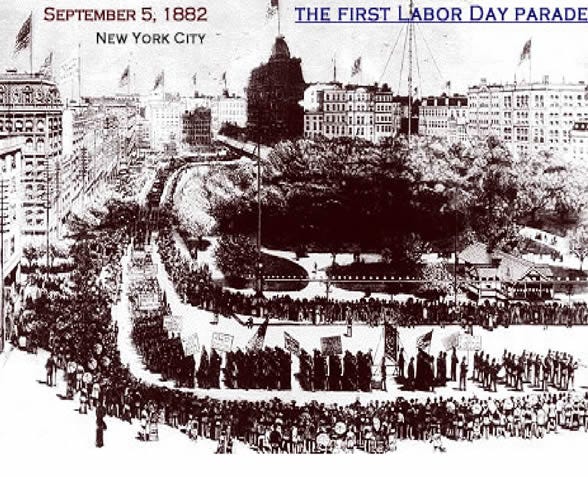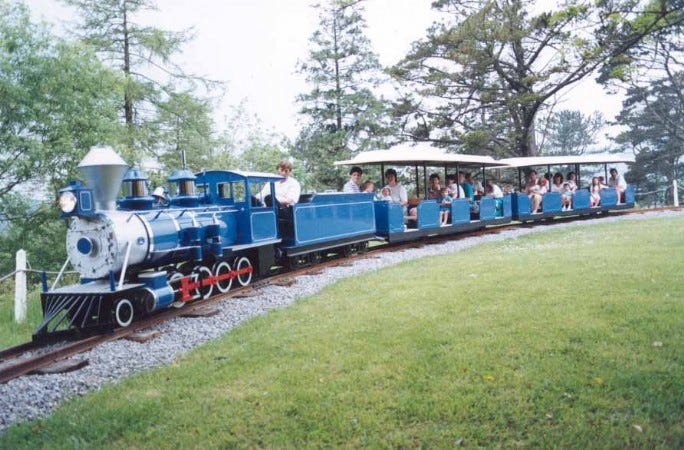To build community, my department once invited the faculty to a game. We each described a job from our past, before we became sober authorities and sages. Our former jobs were posted in a list, and students would guess which professor had once held which job. We had mowed lawns, driven cabs, delivered newspapers, changed diapers (cloth, of course), and plenty of other things I’ve now forgotten.
I struggled to answer the question myself. There were just so many jobs to choose from. Should I tell about the time I sold cheap sunglasses at a parking lot fair on a day so hot that the paint on the merchandise melted, and most of the stock had to be thrown away? Or the summer I tripled up, teaching English as a Second Language, making sandwiches for the Parks and Recreation department, and cleaning dorm rooms?
Today is Labor Day in the U.S., a nationwide holiday for workers since 1894. A New Jersey machinist seems to have had the first idea for the day to honor laborers in 1882. That same year, a co-founder of the American Federation of Labor also pressed for a "general holiday for the laboring classes" to honor those "who from rude nature have delved and carved all the grandeur we behold."1
(Isn’t it wonderful how some people talked in 1882? You see where I developed my taste for extravagant turns of phrase.)

We hear often about the failure of wages to keep up with costs in this country since 1970, but I never hear anyone talk about another consequence of the shrinking middle class: the loss of colorful, unique stories about work.
Writers and artists have always made great case studies for these stories. Often we hear grumbles that society does not value artists enough. (True enough, and also nothing new.) But if we tell more stories about work, it’s possible we would find out that making a living has always occupied a large share of most people’s time, and creative projects have long been tended “after hours,” with tenacity and hope.
In fact, some writers even recommend a day job that’s separate from one’s creative work. Children’s and young adult author and graphic designer
is one of them (“The Perks of a Day Job”). is another. In “don’t quit your day job,” she compares her life as a freelancer to her life as a salaried digital media employee. The conclusion? “listen to me: day jobs rock.” I too appreciate my job history not only for financial stability but also for story material.I have told some of the stories that inspire me about writers and work in previous articles, such as “She Persisted” and “Growing a Newsletter Business — in the Age of the Hanover Kings.” The next one of these stories in the Quiet Reading queue concerns a famous writer who misjudged his viral moment. Stay tuned for that.
But to keep your reading and my writing efforts light this Labor Day, let’s play a game.
How many of these ten American authors can you recognize from their day jobs?
Pro tip: In a browser, roll the cursor over the footnote numbers to view the answer in a popup. Mobile users can click the number or scroll to the footnotes.
Insurance attorney, promoted to vice president of an insurance company.2
Police reporter, public relations writer, and car salesman.3
Elevator operator.4
Civil War nurse, author of a novel about women’s work, and adoptive mother to her niece.5
Homeless teen, trolley conductor, teen mother, singer.6
Writer for a large food corporation, promoted to vice president.7
Ship-calker (while enslaved), later a newspaper owner and orator.8
Schoolteacher and legal stenographer.9
Hotel hostess and gardener.10
Medical office receptionist and billing clerk.11
I learned to drive with a clutch before I was licensed for a car. Of course, I was terrified of the responsibility at first. But my boss at the department store tent sale said driving the kiddie train was a snap. I’d catch right on. His confidence settled my butterflies. I watched carefully.
Stomp this pedal here, he showed me. Turn this key. Put the lever into gear here. Let up on the pedal. Just sit and steer. Have a good ride. Pull this to stop.
The noisy little diesel train lurched, then settled into a sputtering crawl. My job was to pilot my chugging chariot up and down the edge of the parking lot, taking families for Rated-G thrill rides when they needed a break from cotton candy and outdoor shopping.
No one minded all the stops we had to make for pedestrians. They weren’t riding for the scenery. Decades would pass before I understood the service I provided. My slow train let exhausted parents and grandparents take a few minutes off their feet, their children momentarily corralled and amused, the balloons tied to their wrists stringing out through our open-air windows and bobbing in the sun. My easy labor gave someone else a pause.
It didn’t occur to me to wonder if any of my passengers were writers or artists. I knew nothing yet about the rising of creative suns after domestic and day jobs are done.
Your turn:
What job have you done that was:
Unusual or unexpected,
Funny,
Replaced by newer technologies, or
Compatible with artistic work?
(Thank you for keeping it family-friendly.)
Here’s wishing you a rest from at least some of your labors today.
News:
Beginning with the next post, Quiet Reading will shift publication days from Monday to Friday. This will work better with my teaching schedule this term. Of course, you can read new articles whenever you like.
Last week, I was honored to have a guest post featured at “The Feminist Parent,” the positive, encouraging, and informative newsletter of
. My article tells a story about teen and tween girls taking care of each other and rising to the challenges of our time. I think you’ll enjoy it. Check out “Unbound: The Magic of Letting Girls Be Themselves.” Also, notice the headnote about Jo-Ann’s book coming out this week (!), called Sexism and Sensibility.Thank you for your good wishes after my last post. Our household is back in health.
‘Til next,
Tara
“History of Labor Day,” U.S. Department of Labor. https://www.dol.gov/general/laborday/history
Wallace Stevens / Nicholas Parker, “The Day Jobs of 10 Famous Writers,” New York Public Library blog, July 5, 2017.
Kurt Vonnegut / Nicholas Parker, “The Day Jobs of 10 Famous Writers”
Paul Laurence Dunbar / Nicholas Parker, “The Day Jobs of 10 Famous Writers”
Louisa May Alcott / https://en.wikipedia.org/wiki/Louisa_May_Alcott
Maya Angelou / Maya Angelou: A Glorious Celebration
Frederick Douglass / Charles W. Chesnutt, Frederick Douglass
Charles Chesnutt / Helen M. Chesnutt, Charles Waddell Chesnutt, Pioneer of the Color Line
Maine poet Celia Thaxter / https://en.wikipedia.org/wiki/Celia_Thaxter
Me! (Just thought I’d throw in another example from the long resumé I compiled before becoming an academic. It takes a long time to become a professor. Ask others what jobs they’ve held.)
Subscribe to Quiet Reading with Tara Penry
A weekly refuge for our shared humanity inspired by authors, books, and this world of marvels.






Oh Tara! You really should do this for a living.
I once worked for a John Deere tractor dealership in Nampa, Idaho. It was my summer job and my after my high school classes job. I was assigned to paint old John Deere tractors taken as trade-ins on newer models. The old tractors were often greasy, the paint was faded, and most looked completely unloved. They also required special skills just to drive them into the paint booth, such as spinning a big, external flywheel with precise positioning and an agile technique to start them. They required a gentle but skillful use of the hand clutch lever to smoothly put them in motion, all while sitting on a tall iron seat and guiding them with a one position fits all steering wheel, which were kind of like soldiers getting new boots. “What size do I wear? 9 1/2, like everybody else.”
I took it as my vocation to renew those noble old machines. I scrubbed, straightened, sanded, masked, and using an old fashioned John Deere brand alkyd enamel paint that took forever to harden, I learned to spray a finish coat of paint that was mirror shiny. I also learned that the round stuff was painted yellow and the squarish stuff was painted green.
The only downside to the job was my hands often had a green/yellow tint that people noticed and commented on. “Your hands look like you just painted a John Deere tractor. Arrgh, aargh, aurgh!”
That was back in the days before we could unfriend people.
Werner Herzog warns aspiring filmmakers to not quit their jobs and go to film school. In place of academic thinking, he’s is interested in real-life experiences — filmmakers who have done their time in the world, spent a few nights on the street, worked as a bouncer at a night club. I’m sure the same applies for writers. One of my strangest and most eye-opening jobs was as a summer temp working in a frozen pizza factory after my freshman year in college. Pepperoni, pepperoni, pepperoni, one after the other for 8 hours straight, an endless conveyor belt of frozen discs. Mind numbing, but also strangely meditative, though I recognize my great privilege of being able to go back to school in the fall.